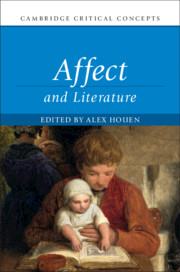Book contents
- Affect and Literature
- Cambridge Critical Concepts
- Affect and Literature
- Copyright page
- Contents
- Notes on Contributors
- Introduction
- I Origins
- II Developments
- III Applications
- Chapter 18 Affect and Environment in Contemporary Ecopoetics
- Chapter 19 Contemporary Crisis Fictions: Twenty-First Century Disaffection
- Chapter 20 Shiny Happy Imperialism
- Chapter 21 The Digital’s Amodal Affect
- Chapter 22 Digital Special Affects: On Exhilaration and the Stun in CGI Blockbuster Films
- Chapter 23 Cartesian Affect
- Index
Chapter 20 - Shiny Happy Imperialism
An Affective Exploration of “Ways of Life” in the War on Terror
from III - Applications
Published online by Cambridge University Press: 16 January 2020
- Affect and Literature
- Cambridge Critical Concepts
- Affect and Literature
- Copyright page
- Contents
- Notes on Contributors
- Introduction
- I Origins
- II Developments
- III Applications
- Chapter 18 Affect and Environment in Contemporary Ecopoetics
- Chapter 19 Contemporary Crisis Fictions: Twenty-First Century Disaffection
- Chapter 20 Shiny Happy Imperialism
- Chapter 21 The Digital’s Amodal Affect
- Chapter 22 Digital Special Affects: On Exhilaration and the Stun in CGI Blockbuster Films
- Chapter 23 Cartesian Affect
- Index
Summary
How does the prospect of endless war against a terrifying abstraction mobilize and perpetuate support for its cause? While the war on terror clearly trades in notions of fear, outrage, and horror it also mobilizes a whole set of feelings less obviously associated with terror – the condescending, intimate colonial desires associated with “soft” power and humanitarian tactics. Considering romance as a lens through which to understand popular narratives about the war on terror, this essay explores intimacy and desire – as well as their intersections with discourses of happiness and honor – as forms of affective capture that serve to perpetuate the war on terror. Though the war on terror is most often associated with a mood of fear, popular stories framed through liberal individualism suggest that it also cultivates an attachment to the affective assemblage of security-happiness-compassion, echoed in the tactics of humanitarian or “soft” power.
- Type
- Chapter
- Information
- Affect and Literature , pp. 373 - 389Publisher: Cambridge University PressPrint publication year: 2020
- 1
- Cited by

